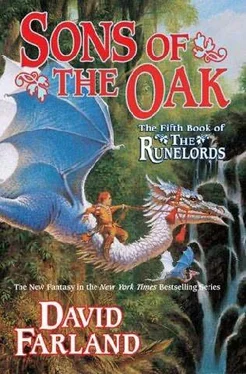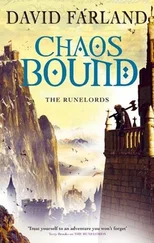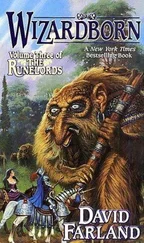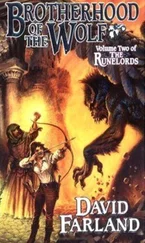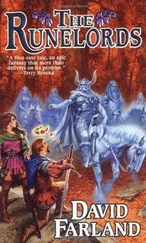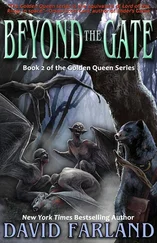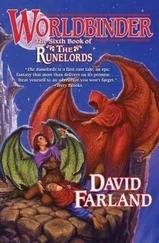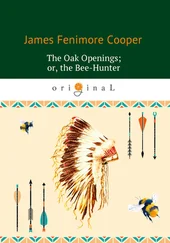David Farland - Sons of the Oak
Здесь есть возможность читать онлайн «David Farland - Sons of the Oak» весь текст электронной книги совершенно бесплатно (целиком полную версию без сокращений). В некоторых случаях можно слушать аудио, скачать через торрент в формате fb2 и присутствует краткое содержание. Жанр: Фэнтези, на английском языке. Описание произведения, (предисловие) а так же отзывы посетителей доступны на портале библиотеки ЛибКат.
- Название:Sons of the Oak
- Автор:
- Жанр:
- Год:неизвестен
- ISBN:нет данных
- Рейтинг книги:5 / 5. Голосов: 1
-
Избранное:Добавить в избранное
- Отзывы:
-
Ваша оценка:
- 100
- 1
- 2
- 3
- 4
- 5
Sons of the Oak: краткое содержание, описание и аннотация
Предлагаем к чтению аннотацию, описание, краткое содержание или предисловие (зависит от того, что написал сам автор книги «Sons of the Oak»). Если вы не нашли необходимую информацию о книге — напишите в комментариях, мы постараемся отыскать её.
Sons of the Oak — читать онлайн бесплатно полную книгу (весь текст) целиком
Ниже представлен текст книги, разбитый по страницам. Система сохранения места последней прочитанной страницы, позволяет с удобством читать онлайн бесплатно книгу «Sons of the Oak», без необходимости каждый раз заново искать на чём Вы остановились. Поставьте закладку, и сможете в любой момент перейти на страницу, на которой закончили чтение.
Интервал:
Закладка:
His troops began advancing slowly, and suddenly the rain pelted, becoming a gray veil that blocked out the hills ahead.
Riding forward, Waggit turned his mount, sent the charge south, and hurried his pace, racing blind, his horse’s hooves churning up mud.
He was alone with his thoughts, and fear rose to his throat. He would be glad when this day was done, glad to ride home to his wife and sit beside a roaring fire with his daughter on his knee. He conjured a scene where Farion giggled as he sang to her and fried hazelnuts in butter and sea salt over the open hearth, while their yellow kitten crept about, trying to see what they were up to.
That is the way it will be, he thought.
He could not face any other alternative.
And all too soon, they came out of the rain. Ahead lay a stone fence, with a high hedge that blocked his way to the right and left; barring the road ahead was an old sheep gate made of wooden poles. Beyond, a lonely-looking road stretched through sodden woods.
Asgaroth’s soldiers guarded the road. Waggit could see warriors of Inter-nook hunching down behind the gate in their sealskin coats, horned helms making them look laughably like cattle, their huge battle-axes at the ready. Others hid behind the stone fence to the right and left of the gate, their bows drawn.
“Clear them out!” Waggit shouted to his men. “Clear them out!”
Holding a shield in his left hand, and a black lance in the crook of his right arm, he nodded sharply so that the visor of his helm dropped. He spurred his mount.
Arrows began flying past as he raced toward the gate. One blurred toward his chest, and only luck let him angle his shield to catch it on the edge, sending it ricocheting into the sky. Another glanced off of his epaulet, and a third struck his mount near the throat, shattering in the barding, and the broken shaft went flying into his leg.
Waggit heard horses scream and men grunt in surprise behind him as arrows took them.
Then his own archers began firing back, sending a hail that blackened the skies.
Ahead, some of the axmen roared in anger as arrows plunged into them. Waggit saw one huge axman, his golden hair flowing down his shoulders in braids, pull an arrow from his gut, shake it in the air, then lick the blood from it, as if to mock the attacker’s petty efforts. At the last, he bit the arrow in two and spat it out, then shouldered his ax, eyes blazing as he held his post.
That man is mine, Waggit thought.
His horse was charging directly toward the fearsome warrior.
He’ll cut my mount’s belly open when it tries to leap the fence, Waggit thought. That’s what he’s after.
But Waggit had a lance in his hand, a cold wet lance that was growing slippery in the rain. He gripped it tightly, tried to steady his aim as he squatted low.
Suddenly Waggit became aware of a dozen riders thundering at his side and behind him. The riders on the left held their shields in the left hands, while those to the right shielded the right. Thus they rode in a shield wall to meet their destiny.
And suddenly Waggit’s horse was leaping in the air to clear the gate, and his own lance was aimed at the warlord’s head.
The warlord grinned, bloody teeth flashing, and tried to duck and swing his ax all in one swift motion, aiming to disembowel Waggit’s leaping mount.
But Waggit quickly dropped the point of the lance, taking the warlord in the face.
As the metal point of his lance bit into flesh, snicked through bone, and clove through the warlord’s skull, Waggit shouted, “Chew on this!”
Then the weight of the carcass dragged the lance from Waggit’s hand and he was over the wall. His horse hit the muddy road and went down, sliding.
Arrows whipped overhead and one snapped into Waggit’s helm.
The other horsemen were coming, and Waggit realized that their mounts would trample him to death if he didn’t get out of the way.
Waggit tried to leap from his own saddle and pull out his saber as the horse skidded.
He hit the ground and went down, skidding as he fell, realizing too late that the enemy troops had trampled this part of the road and peed on it, turning it into a muddy brew, all in an effort to slow just such a charge.
He heard other horses falling behind him, and he had the good sense to try to get out of their way.
Keeping his shield high, Waggit tried to leap up, but found himself scrambling and crawling through the mud toward the safety of a beech tree. Another horse fell behind Waggit, clipped his leg, and sent him sprawling backward.
A swordsman of Ahshoven, in battle armor as gray as the rain, raced up toward Waggit, intent on dealing a death blow, his breath fogging the air around his black beard, and all that Waggit could do was to raise his sword and parry feebly.
But suddenly a horseman came thundering down the road, and a lance struck the swordsman in the gut, lifting him from his feet.
So powerful was the grip of the lancer that the man was borne away, his face a mask of shock and regret, until the lancer deigned to hurl him and his lance aside.
Waggit whirled and searched for more attackers.
But Waggit was a scholar more than a warrior, and better fighters with grand endowments of brawn and metabolism were already ahead of him, masters of the slaughter. Asgaroth’s troops were no match.
Waggit saw that there had only been a hundred men or so at the gates, hardly enough to slow his troops, much less stop them. And now they were running along the hedgerow, heading toward the wooded hills, hoping to escape.
Waggit suddenly became aware of a sharp pain in his leg, a pinching sensation.
Reaching down near his crotch, Waggit felt the broken shaft of the arrow that had pierced his thigh. In the heat of battle, he’d forgotten about it.
He pulled, felt a sharp pain as the bodkin came clear. The arrowhead was not a broad tip, thankfully. Such a blade would have been likely to sever an artery. Instead it was long and sharp, like a nail, meant to pierce armor.
He peered down at his wound. Blood wasn’t pumping out. The shaft had missed the artery. He licked the tip of the arrowhead, in mockery of the enemy warriors that were dying on the battlefield, and tasted the salt of his own hot blood. He hurled the broken arrow to his feet, where he crushed it in the mud.
Then he pulled out his kerchief and tied it around his leg. The best thing that he could do now was to apply some steady pressure. And what better way to apply pressure than to sit on the back of a horse? he wondered.
His mind clouded by the haze of battle, he decided to ride on, to let the wound close even as he tracked down and slaughtered Asgaroth’s scouts.
11
In a good battle, every man is a hunter and every man is hunted.
— Sir BorensonIome listened for sounds of pursuit, but the burble and rush of the river as it flowed among stones and hanging branches masked everything. She relied upon her several endowments of hearing as she listened for pursuit, but the only sounds that came to her were the wind hissing through trees, the occasional water rat rustling among the reeds at the water’s edge, the cries of burrow owls hunting on the wing, and, at last, the soft snoring of the children in their little shelter.
The miles flowed past, and with each mile traveled, Iome rested a little easier.
Overhead, a storm brewed, heavy clouds scudding in from the west, blotting out the stars. The air was heavy, but not with the familiar taste of fog. Instead when Iome breathed, it came in sickly and smothering, so that she found herself gasping for breath like a fish out of water.
A wind suddenly rushed up the canyon, and the boughs of pine trees bobbed and swayed while dried cattail reeds along the bank gave a death rattle.
Читать дальшеИнтервал:
Закладка:
Похожие книги на «Sons of the Oak»
Представляем Вашему вниманию похожие книги на «Sons of the Oak» списком для выбора. Мы отобрали схожую по названию и смыслу литературу в надежде предоставить читателям больше вариантов отыскать новые, интересные, ещё непрочитанные произведения.
Обсуждение, отзывы о книге «Sons of the Oak» и просто собственные мнения читателей. Оставьте ваши комментарии, напишите, что Вы думаете о произведении, его смысле или главных героях. Укажите что конкретно понравилось, а что нет, и почему Вы так считаете.
